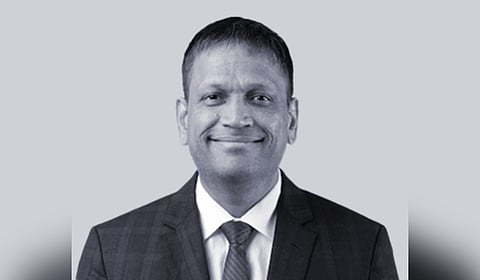

The Initial Public Offer (IPO) of information technology company Hexaware Technologies got listed on the bourses at 5 per cent premium at Rs 745 (against the issue price of Rs 731) on Wednesday.
Private Equity firm Carlyle, which owned 95 per cent in the company, offloaded 20 per cent stake through the public issue. Chief Executive Officer R Srikrishna spoke to the New Indian Express immediately after the listing. Here’s the excerpts:
What is your reaction to the listing and the stock price movement?
We are not focused on short-term stock price movements. Our goal is to deliver strong performance every quarter for the next decade, and the stock price will take care of itself. A volatile market is a great opportunity for investors to buy into quality businesses like ours.
How does it feel coming back to the public market after five years?
We are very excited about being a public company again. Our employees love it, and so do our customers. For employees, it’s a chance to see the company’s strong performance every day, and for customers, it reassures them that we are investing in future technologies.
The promoters have divested around 20%. Will this impact the company’s culture or DNA?
No, our company has always been and will continue to be a management-run company. While Carlyle has added value, they haven't changed how we operate. Nothing will change in our culture or DNA.
Why did you choose the Offer for Sale (OFS) route instead of an IPO?
We have ample cash in the business—over USD200 million at the end of the year. We also generate nearly 100% of our post-tax profits as cash due to strong working capital management. Since we don’t need additional capital, an OFS made more sense than an IPO.
Retail investors subscribed only 11 per cent of the shares on offer. Are you disappointed with the retail participation in your offer?
Not at all. We now have nearly 200,000 shareholders. The market has been volatile, with a difficult trading period when we opened the issue. However, we are focused on long-term performance, and I am confident we will create value for shareholders.
Hexaware is a relatively smaller IT company in India. How do you see its future in a rapidly evolving technology landscape?
We may be smaller than some of the larger IT firms, but we are not small. By revenue, we are the 7th largest. Over the last decade, we have consistently gained market share from bigger competitors and grown at over twice the industry average. We expect to continue this trend.
Given that 72 per cent of your revenue comes from the US, do you see risks due to policy changes under Trump?
The US is by far the largest, most robust tech services market in the world. If you want to be a meaningful player, you have to be meaningful in the US, the biggest companies in the world, are all there, and many of them are our clients. I think the animal spirits of Trump’s policies far outweigh any potential downsides.
So, think of stable tax environment, no threat of taxes going up, lower regulation, and more support for M&As mean that businesses feel more confident. Quick early evidence -- we are in earning cycle, 77 per cent of S&P 500 companies have announced results. And what's the outcome of that? S&P 500 reaches an all-time high. So, if it's good for our clients, it's good for our industry, it’s good for us.
What about concerns regarding H-1B visa policies?
The major disruptions in H-1B visas happened earlier. We were well-prepared and handled it smoothly. Our current dependence on H-1B visas is minimal. We still hire in the US but do not rely heavily on new H-1B visas from India.
Do you have plans to diversify geographically, especially in India?
Yes, we have already diversified. Our Europe revenue has grown from 15 per cent to 22 per cent, even with currency depreciation. Now, we plan to focus on Asia, where revenue is currently at 6 per cent. India and the Middle East will be key focus areas as they offer strong growth potential, being somewhat insulated from global economic fluctuations.
Since most of your revenue is in foreign currency, does the depreciation of the Indian rupee benefit you?
Yes, a weaker rupee is beneficial for us, as 97 per cent of our revenue comes from foreign currencies. However, we do not speculate on forex. Our focus remains on strong growth and operations. Currency fluctuations provide additional benefits but do not drive our strategy.
What is your view on AI? Do you see it as a challenge or an opportunity?
AI is definitely an opportunity. Right now, the biggest companies are investing heavily in AI, but the real value will come when AI is integrated into enterprise software. That’s where companies like us come in. While AI might reduce effort on individual projects, it will lead to many more projects, driving growth.
What is your take on work-life balance?
Work-life balance is a personal choice. People should find a balance that allows them to work for 50+ years. Life expectancy is increasing, and retirement at 60 may not be practical. Balance will change over time—people may work 80-hour weeks when younger and scale down later. It’s about sustainability over a long career.